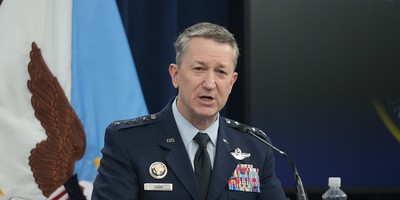Conservatism lost one of its most influential voices this week. William F. Buckley Jr. -- author, editor, television host, and one of America's most important public intellectuals -- died in his home Wednesday at 82. Buckley shaped the modern conservative movement into a force in American politics, and he so did with equal measure of charm and intellectual rigor.
Like many conservatives, I was influenced by Buckley, although as much in a personal as political fashion. I remember the first time I met him. I had recently been nominated by President Ronald Reagan to be director of the U.S. Commission on Civil Rights, along with three new commissioners. All of us were Democrats who shared President Reagan's antipathy for racial preferences, but our nominations were in trouble. Liberal interest groups were fighting tooth and nail to keep us off the commission, and the White House decided we should take our case directly to the American people via television appearances. Buckley obliged by inviting me and two of my fellow nominees on his popular show, "Firing Line," which was then taped in New York.
I was very nervous, never having been on national television before. But Buckley was disarming, with his characteristic wide-eyed grin -- that is, until the interview started. Suddenly, he was transformed into this intimidating presence on stage. He peppered my colleagues with questions, and then turned his attention to me.
While I heard words coming out of his mouth, I had no idea what he was asking because most of the question was in Latin. I must have looked like a deer in the headlights, but I managed to say something about the importance of judging people as individuals, not as members of racial or ethnic groups.
Recommended
Afterwards, he complimented us on our performances. "It would have been a lot easier if all the questions had been in English," I bantered.
He raised his eyebrow, with that famous twinkle in his eye, and said, "Linda, I've taught you the most important lesson you will ever learn about being interviewed. Ignore the question you're asked and make your best argument. Your aim isn't to please the interviewer but to influence the audience."
It was great advice. And Buckley was certainly a master at influencing audiences. For years, Buckley entertained Americans -- even those who vehemently disagreed with him -- by making them think. But perhaps his greatest contribution to American conservatism was in taking on the prejudices and bigotry that occasionally infect the Right.
Early in his career, he took on the John Birch Society for its anti-Semitic rants; and in 1991, he wrote a long essay called "In Search of Anti-Semitism" for National Review magazine. In it, he took on two fellow conservatives: Joseph Sobran, who had been an editor at NR, and Pat Buchanan, whose columns and remarks about Jews and the Middle East had taken on a nasty edge. Buckley said he found it "impossible to defend Pat Buchanan against the charge that what he did and said during the period under examination amounted to anti-Semitism, whatever it was that drove him to say and do it…"
Words mattered to William F. Buckley Jr., and he made them matter to the rest of us as well, even when we sometimes needed an unabridged dictionary by our side to read his "Notes & Asides" in NR. I'm still not sure what he meant by "to immanentize the eschaton," a phrase he once used in the magazine -- and apparently I am not alone, as an amusing correspondence reproduced in his last book, "Cancel Your Own Goddam Subscription: Notes & Asides from National Review," reveals. You never knew with Buckley whether he was pulling your leg or sincerely trying to expand your vocabulary.
I never managed to thank him for the valuable lesson he taught me at the beginning of my public career. But perhaps it's not too late: Requiescas in pace, amice.

























Join the conversation as a VIP Member